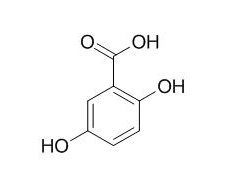Gentisic acid
Gentisic acid, an active metabolite of salicylic acid degradation, has a broad spectrum of biological activity, such as antibiotic, anti-inflammatory, antirheumatic and antioxidant properties; it also has antimutagenic/protective effects that may contribute to human health. Gentisic acid has protective effect against cyclophosphamide induced genotoxicity and hepatotoxicity in Swiss albino mice.
Inquire / Order:
manager@chemfaces.com
Technical Inquiries:
service@chemfaces.com
Tel:
+86-27-84237783
Fax:
+86-27-84254680
Address:
1 Building, No. 83, CheCheng Rd., Wuhan Economic and Technological Development Zone, Wuhan, Hubei 430056, PRC
Providing storage is as stated on the product vial and the vial is kept tightly sealed, the product can be stored for up to
24 months(2-8C).
Wherever possible, you should prepare and use solutions on the same day. However, if you need to make up stock solutions in advance, we recommend that you store the solution as aliquots in tightly sealed vials at -20C. Generally, these will be useable for up to two weeks. Before use, and prior to opening the vial we recommend that you allow your product to equilibrate to room temperature for at least 1 hour.
Need more advice on solubility, usage and handling? Please email to: service@chemfaces.com
The packaging of the product may have turned upside down during transportation, resulting in the natural compounds adhering to the neck or cap of the vial. take the vial out of its packaging and gently shake to let the compounds fall to the bottom of the vial. for liquid products, centrifuge at 200-500 RPM to gather the liquid at the bottom of the vial. try to avoid loss or contamination during handling.
Plants (Basel).2021, 10(7):1376.
Front Nutr.2023, 10:1168095.
Universiti Tunku Aboul Rahman2023, 6263.
Patanjali Research Foundation2024, ssrn.4807357
Molecules.2020, 25(17):3783.
J Agric Food Chem.2020, 68(43):12164-12172.
Molecules.2023, 28(19):6767.
Chemical Engineering Journal2024, 500:157110
Viruses.2021, 13(11):2118.
Molecules. 2013, 18(7):7376-88
Related and Featured Products
Drug Chem Toxicol. 2017 May 16:1-7.
Cytotoxicity, mutagenicity, and antimutagenicity of the gentisic acid on HTC cells.[Pubmed:
28511592 ]
Gentisic acid (GA) exhibits antioxidant, anti-inflammatory, and antibiotic activities. This substance can be found in citrus fruits, grapes, olive oil, and peas.
METHODS AND RESULTS:
Considering that there are few studies in the literature on the toxicity of GA, the present work aimed to investigate its cytotoxic, mutagenic, and antimutagenic activities on HTC cells. GA was diluted in culture medium at the final concentration of 0.08, 0.16, 0.8, 1.6, and 8 μg/mL. The cytotoxicity was determined by the MTT assay and Trypan Blue exclusion method, with methyl methanesulfonate and doxorubicin as positive controls, respectively. The cytokinesis-block micronucleus assay determined the mutagenic/antimutagenic activity with benzo[a]pyrene as positive control. Negative control received culture medium only. GA (0.08-8 μg/mL) was not cytotoxic to HTC cells by the MTT assay nor the Trypan Blue exclusion method as no statistical difference was observed when compared to the control. Concentration of 0.08 and 0.8 μg/mL showed no mutagenic or clastogenic effects, as no significant micronuclei inductions were observed, different from 8 μg/mL, that was mutagenic. Furthermore, none of the concentrations presented an antiproliferative activity. The antimutagenic activity of GA (0.08 μg/mL) was observed at the simultaneous treatment, as it reduced the frequency of micronuclei by 76% (24 h) and 79% (48 h). Although pre- and post-treatments were not statistically different from the mutagen, they reduced the induced-damage by 11% and 21%, respectively.
CONCLUSIONS:
The present study indicated the absence of cytotoxicity and antiproliferative activities of GA, in addition to their antimutagenic/protective effects that may contribute to human health.
Eur J Pharmacol. 2005 Apr 25;513(3):173-9.
Gentisic acid, an aspirin metabolite, inhibits oxidation of low-density lipoprotein and the formation of cholesterol ester hydroperoxides in human plasma.[Pubmed:
15862799]
Gentisic acid, an aspirin metabolite, has an antioxidant effect, although its detailed mechanism remains elusive.
METHODS AND RESULTS:
The present study was designed to determine whether it inhibits low-density lipoprotein (LDL) oxidation and the formation of lipid hydroperoxides in human plasma. The susceptibility of LDL oxidative modification was investigated by a method using 2,2'-azobis or Cu2+. To study the effect of Gentisic acid on free radical-induced damage to plasma lipids, cholesterol ester hydroperoxides generated by incubating human fresh plasma with Cu2+ and Gentisic acid was analyzed. Gentisic acid inhibited LDL oxidation in a concentration-dependent manner. It significantly inhibited the formation of cholesterol ester hydroperoxides in plasma, and was consumed after the depletion of ascorbic acid and reduced form of coenzyme Q-10 (CoQH2-10), whereas concentrations of other antioxidants remained unchanged.
CONCLUSIONS:
Gentisic acid had a potent free radical scavenging activity with a minimal chelating effect. The potent antioxidant property of Gentisic acid may partly account for the anti-atherogenic effects of aspirin.
J Pharm Pharmacol. 2012 Feb;64(2):259-67.
Modulatory effects of gentisic acid against genotoxicity and hepatotoxicity induced by cyclophosphamide in Swiss albino mice.[Pubmed:
22221102 ]
This study evaluated the protective effects of Gentisic acid (GA) against genotoxicity and hepatotoxicity induced by cyclophosphamide (CP) in Swiss albino mice.
METHODS AND RESULTS:
Mice were pretreated with GA orally at doses of 50 and 100 mg/kg for 14 consecutive days before the administration of a single intraperitoneal dose of 50 mg/kg CP. The ameliorative effect of GA on genotoxicity was studied using the in-vivo bone marrow micronuclei induction test, DNA integrity and alkaline unwinding assay. The activity of various oxidative stress enzymes were estimated in hepatic tissue. A single intraperitoneal administration of CP in mice increased the malondialdehyde level, depleted the glutathione content and antioxidant enzyme activity (glutathione peroxidase, glutathione reductase, catalase and quinone reductase), and induced DNA strand breaks and micronuclei induction. Oral pretreatment with GA at both doses caused a significant reduction in malondialdehyde and glutathione levels, restoration of antioxidant enzyme activity, reduction in micronuclei formation and DNA fragmentation. Serum toxicity marker enzymes such as aspartate aminotransferase, alanine aminotransferase and lactate dehydrogenase were increased after CP treatment but restored in GA pretreated groups.
CONCLUSIONS:
The results support the protective effect of GA against CP induced genotoxicity and hepatotoxicity.



